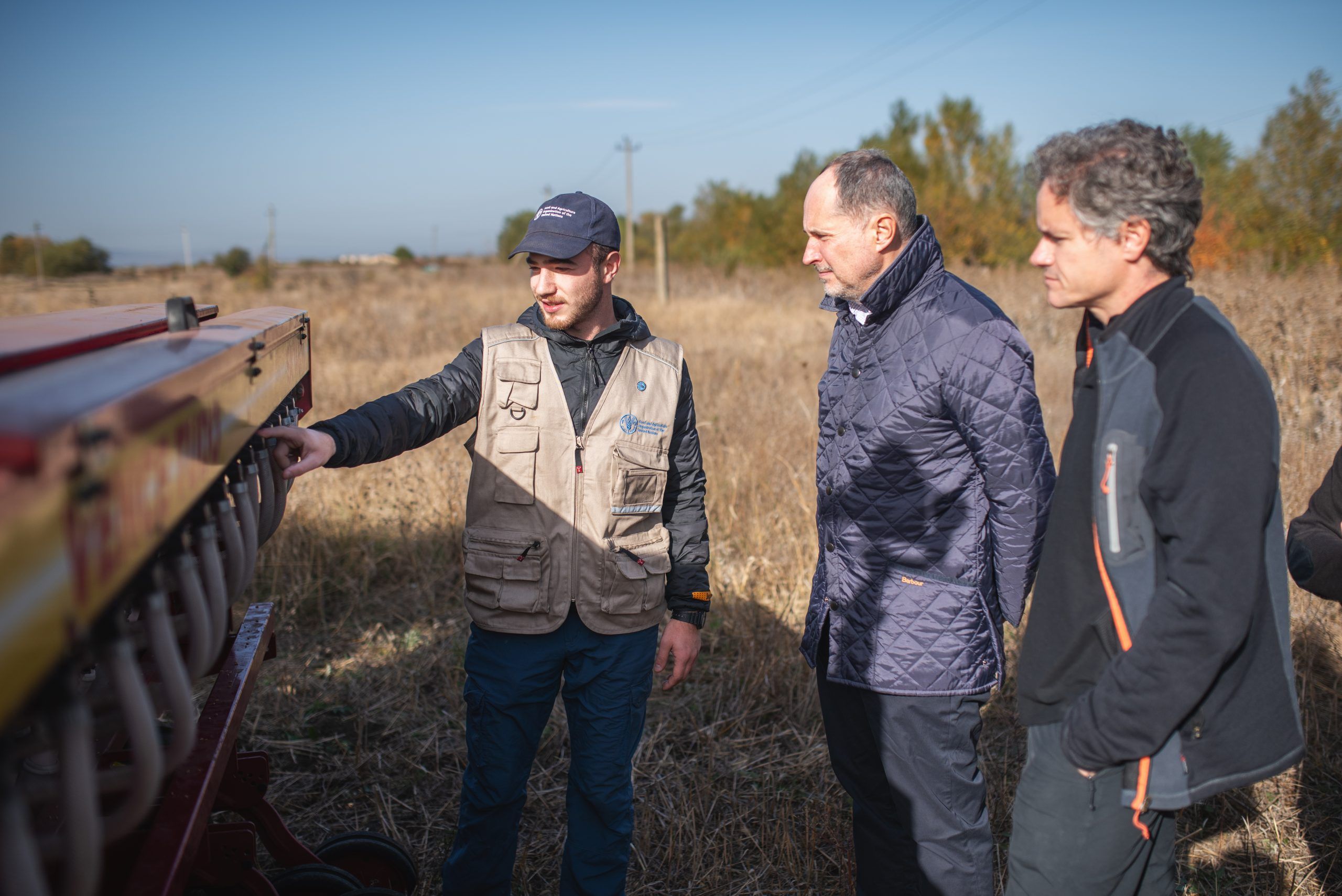
EU Ambassador Herczynski Visited EU-FAO Beneficiary Farmers in Shida Kartli
Pawel Herczynski, Ambassador of the European Union to Georgia, visited Nadarbazevi and Kitsnisi villages in Shida Kartli and met with the farmers who have benefited from EU-supported FAO activities in the region. Cereal and dairy farmers, as well as beekeepers, had the opportunity to share their experiences with Ambassador Herczynski and explain how, within ENPARD IV, funded by the EU and Sweden, FAO’s work has helped them toward improved food security, food safety and economic development.
In Nadarbazevi, Ambassador Herczynski participated in the planting of cereals with the no-till planter. The Conservation Agriculture technology is an environmentally sustainable method of planting cereals when the soil is much less disturbed as planting is done without tilling. It also significantly reduces the planting costs for farmers.
Under ENPARD, through the support of the EU and Sweden, FAO has helped over 200 cereal farmers plant 1,500 hectares of land in Georgia. As a result, improved access to no-till farming equipment has decreased production costs. Importantly, their fields have become more resilient to environmental risk factors and climate change.
Ambassador Herczynski also visited a Farmer Field School in Kitsnisi to participate in an EU-supported FAO training on cheesemaking.
Under ENPARD IV, funded by the EU and Sweden, FAO has already trained 2 100 farmers to support them in improving food safety standards through hands-on training using the Farmer Field School corporate modality. Training sessions involve peer-to-peer interaction along with FAO’s technical guidance.
Ambassador Herczynski took part in cheese production, talked with the participants of several Farmer Field Schools in Gori Municipality, and emphasised the importance of advancing food safety standards in dairy production to ensure that Georgian families have access to high-quality, nutritious food while also highlighting the continued support of the EU to farming communities in all regions of the country.
“I am delighted that the European Union, together with the FAO, is improving Georgian agricultural techniques and methods in order to protect the environment and to help Georgian farmers to be more profitable. The ENPARD project has been an important contributor to the country’s agricultural development. We are glad to be working with the farmers, food businesses, and state institutions to collaboratively strive toward more sustainable and cost effective agriculture in Georgia” – says the EU Ambassador Pawel Herczynski.
“Through the support of the EU and Sweden, under ENPARD, FAO has been training thousands of farmers. We have supported hundreds of them with matching grants for improved equipment, but more importantly, we have increased the capacities of thousands of smallholder farmers, which is key to increasing the quantity and quality of the production, providing increased economic gain for these farmers and reducing rural poverty. But much more can be done to ensure inclusiveness and environmental considerations in the support provided to the agricultural sector following the EU experience. Partnering with the EU and Sweden, FAO continues working with state institutions, farming communities and the private sector to ensure sustainable development in the agricultural sector,” says Javier Sanz Alvarez, the FAO Programme Coordinator.
The European Union supports rural development in Georgia through its ENPARD Programme. Aiming to reduce rural poverty, ENPARD has been implemented since 2013. The Programme started by supporting the development of national agriculture potential. Afterwards, it concentrated also on creating economic opportunities for rural populations in Georgia. Since 2021, the Programme has also been working on improving food safety in the country, with additional support from Sweden, and having FAO and the Czech Development Agency as the main implementers of this food safety component under ENPARD IV.
Contact:
Natia Khuluzauri, Communication Officer; natia.khuluzauri@fao.org; +995577245502